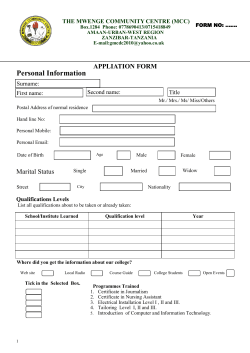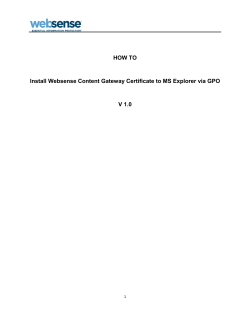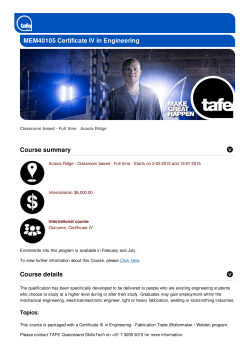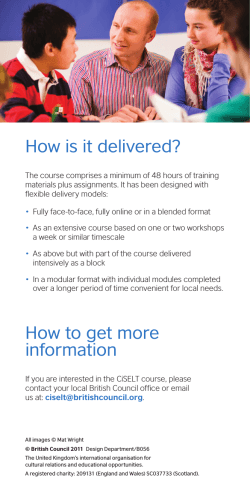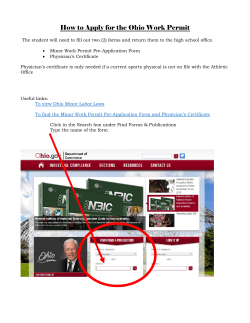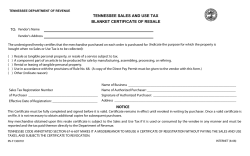
Seafarer medical and eyesight requirements This guideline covers the medical and eyesight requirements
Seafarer medical and eyesight requirements This guideline covers the medical and eyesight requirements for seafarer certificates Eyesight and medical requirements – Guidance for seafarers Page 8 of 9 Seafarer medical and eyesight requirements Last updated: 30 October 2014 In this guide 1. Overview 2 2. Key requirements 3 3. National (non-STCW) certificates 4 3.1 Medical examination 4 3.2 Eyesight and colour vision 4 4. STCW and STCW-F certificates 5 4.1 Medical examination 5 4.2 Eyesight and colour vision 5 5. Medical requirements 6 5.1 The medical examination 6 5.2 Categories of medical certificate 7 5.3 Vaccinations 7 6. Eyesight requirements 8 6.1 Visual acuity 8 6.2 Corrective lenses 8 6.3 Monocular vision 8 6.4 Colour vision 8 6.5 General eyesight and colour vision standards 9 Medical and eyesight requirements – Guidance for seafarers Page 9 of 9 1. Overview Seafarer medical and eyesight requirements This guideline provides general information about the medical requirements and examination procedures for seafarers. The information in this guideline applies to: national certificates International Convention on Standards of Training, Certification and Watchkeeping for Seafarers (STCW) certificates certificates aligned with the International Convention on Standards of Training, Certification and Watchkeeping for Fishing Vessel Personnel (STCW-F-aligned). The seafarer certification framework, SeaCert, introduced new requirements for medical fitness from 1 April 2014. The most significant change is the requirement for applicants for national certificates to undergo a medical examination. Previously, a medical examination was not required for national certificates unless applicants were either aged under 18 and working on vessels operating outside restricted limits, or aged over 65. Maritime New Zealand (MNZ) references Regulation 1/9 of STCW for medical standards, including those for eyesight. This is the regulation for standards of medical fitness for seafarers and the procedures for issuing a medical certificate. For further guidance, refer to the ILO/IMO (International Labour Organization/International Maritime Organization) Guidelines on the medical examinations of seafarers (www.ilo.org). For information about the medical and eyesight requirements for a specific seafarer certificate, refer to the guideline for that certificate on MNZ’s website. More details about the medical and eyesight standards for all seafarer certificates are provided in the Advisory Circular for Part 34: Medical Standards on MNZ’s website: maritimenz.govt.nz/seafarers Disclaimer: These guidelines provide information and explanations about the requirements set out in the maritime rules, but are not a substitute for the rules themselves, which are the law. These guidelines refer to provisions in Maritime Rules Part 34, Medical Standards. In this guideline, any references to ‘we’ or Maritime New Zealand (MNZ) are references to the Director or a person acting under the Director’s delegated authority. maritimenz.govt.nz/rules Eyesight and medical requirements – Guidance for seafarers Page 8 of 9 2. Key requirements All new applicants for certificates must undergo a medical examination and receive a certificate of medical fitness. All holders of national and STCW certificates of competency and proficiency must hold a valid certificate of medical fitness. Medical and eyesight standards for all certificates have been aligned more closely with STCW requirements (with some concessions made for national certificates). Any New Zealand registered medical practitioner may conduct the medical examination for a national certificate. Medical examinations for STCW and STCW-F-aligned certificates continue to require an approved medical practitioner. Medical and eyesight requirements – Guidance for seafarers Page 9 of 9 3. National (non-STCW) certificates The medical and eyesight standards for national certificates are based on the STCW Convention. 3.1 Medical examination The medical examination for any national certificate may be conducted by any New Zealand registered medical practitioner. You should describe your expected work duties and the operations of the vessel you will be working on, so that the medical examiner can make a fair assessment of your fitness for duties. The medical practitioner will consider the operating area of the vessel you will be working on when they assess your medical fitness. For example, you may be assessed as fit for duties on a vessel operating in restricted limits, but not considered fit for duties on vessels voyaging further from shore. This discretion might be applied in the case of a seafarer with a known medical condition or a seafarer who relies on a medication and needs to work in an operating area that is close to shore-based medical facilities. A certificate of medical fitness is valid for two years unless otherwise specified. Use the link on MNZ’s website to find a registered medical practitioner: maritimenz.govt.nz/seafarers 3.2 Eyesight and colour vision STCW Table A-I/9 is used as the basis for eyesight standards. All applicants must meet the standards for visual acuity and colour vision required by their certificate (see 6. Eyesight requirements). Colour vision test results for all national deck certificates, including renewals, are valid for six years. New deck certificates You must have your eyesight and colour vision tested by a registered optometrist. Use the link on MNZ’s website to find a registered optometrist: maritimenz.govt.nz/seafarers New engineering certificates The medical practitioner will test your eyesight as part of the medical examination. However, if they have any concerns about the test results, they may refer you to an optometrist for further testing. Note: There are no colour vision standards for national engineering certificates, and testing is not required. Renewing deck and engineering certificates Pass results from eyesight tests given as part of a medical examination are acceptable for renewal of national deck and engineering certificates. Eyesight and medical requirements – Guidance for seafarers Page 8 of 9 4. STCW and STCW-F certificates The medical and eyesight standards for STCW and STCW-F-aligned certificates are as specified in the STCW Convention. 4.1 Medical examination Certificates of medical fitness are valid for two years, unless otherwise specified. New STCW and STCW-F certificates The medical examination must be conducted by a medical practitioner approved by MNZ. Renewing STCW and STCW-F certificates You must hold a valid certificate of medical fitness issued by an approved medical practitioner. Approved medical practitioners are listed on MNZ’s website: maritimenz.govt.nz/seafarers 4.2 Eyesight and colour vision STCW Table A-I/9 is used as the basis for eyesight tests. All applicants are required to meet the standards for visual acuity and colour vision required for their certificate (see 6. Eyesight requirements). For all STCW and STCW-F-aligned certificates, the colour vision test is valid for six years. New deck certificates Your eyesight and colour vision must be tested by a registered optometrist. Use the link on MNZ’s website to find a registered optometrist: maritimenz.govt.nz/seafarers New engineering certificates Your eyesight and colour vision will be tested by the medical practitioner as part of the medical examination. However, if they have any concerns about your test results, you may be referred to an optometrist for further testing. If you fail the colour vision test a restricted certificate may be permitted, as considered appropriate by the Director. Renewing deck and engineering certificates Passing the eyesight and colour vision tests given as part of your medical examination is acceptable for renewal of STCW and STCW-F deck and engineering certificates. Medical and eyesight requirements – Guidance for seafarers Page 9 of 9 5. Medical requirements 5.1 The medical examination You should arrange to have your medical examination with a medical examiner who is appropriate for your certificate. (Depending on whether you are applying for an STCW or national certificate, the examiner will need to be a medical practitioner approved by MNZ or may be any registered medical practitioner.) There will be a fee for the medical examination. Before the examination begins, either the examining medical practitioner or you should print out the medical examination form – seafarers and the certificate of medical fitness – seafarers from MNZ’s website: maritimenz.govt.nz/seafarers Two copies of the medical examination form and three copies of the certificate of medical fitness are needed. The medical examination form has sections for you to complete with the medical practitioner before the examination and other sections for the medical practitioner to complete during the examination. The medical practitioner will fill out the certificate of medical fitness and allocate one of six possible medical categories (see Categories of medical certificate below), based on the results of the examination. If your certificate of medical fitness is allocated the medical category B, C, D or E, you have the right to apply for another medical examination (the medical practitioner must inform you about this in writing). If applicable, the medical practitioner should issue you with a report outlining any conditions to be met before you apply for re-examination. These conditions would include any medical or other submissions you need to provide to support your application. If the medical practitioner finds that you need to wear corrective lenses to meet eyesight standards, they will endorse your certificate of medical fitness with that requirement. At the end of your examination, the medical practitioner will issue your certificate of medical fitness and give you a copy of the completed medical examination form. They will send a copy of your certificate of medical fitness to MNZ, and you may also send a certified copy with your seafarer certificate application. Eyesight and medical requirements – Guidance for seafarers Page 8 of 9 5. Medical requirements (continued) 5.2 Categories of medical certificate Medical certificates are issued in six categories, as shown below: Category Category name Conditions A Unrestricted sea service None A(T) Unrestricted sea service (Temporary) Medical surveillance required at intervals. B Restricted sea service only Restrictions endorsed on the medical certificate C Temporarily unfit for sea service Endorsed with number of weeks before the seafarer can be re-examined D Indefinitely unfit for sea service Endorsed with number of months before the seafarer can be re-examined E Permanently unfit for sea service May not work at sea Certificate is valid until the time the surveillance is required Notes: For category A, an unrestricted certificate of medical fitness is valid for two years from the date of the examination, unless you are under 18 years of age, in which case the certificate of medical fitness is valid for one year. For category A(T), the expected duration of your tour of duty will be taken into account when the medical practitioner considers how often medical surveillance should be done. In this case, the certificate’s expiry date will be the same as the date for the medical surveillance. For category B, your employment may be restricted by conditions such as shipping trades (the nature of the operation), geographical areas, types of vessel or the nature of your duties. Any restrictions will be described on the certificate and, if appropriate, the certificate expiry date may have a shorter duration than the standard two years. 5.3 Vaccinations If you are employed on a commercial vessel that is operating in unlimited waters, you must carry an acceptable certificate indicating the type, place and date you received all of your vaccinations. Medical and eyesight requirements – Guidance for seafarers Page 9 of 9 6. Eyesight requirements 6.1 Visual acuity For deck certificates, distance vision requirements need to be met in each eye. For engineering certificates, distance vision requirements may be met with combined eyesight vision (both eyes together). 6.2 Corrective lenses If you need to wear corrective lenses to meet eyesight standards, this will be noted on your certificate. You will be required to wear glasses or contact lenses while performing watchkeeping duties and must have a spare pair conveniently available on board ship. 6.3 Monocular vision Monocular vision is not acceptable if you are applying for a deck certificate for the first time. However, serving seafarers who hold deck certificates and have monocular vision or become monocular may be assessed for fitness for duties. The functioning eye must fully meet the standards required for the duties performed and the weaker eye must not impair overall vision through diplopia (double vision) or other forms of interference. You cannot make an application for a medical examination until at least six months have passed since your monocular vision was confirmed. 6.4 Colour vision For STCW and STCW-F deck certificates, applicants must meet all colour vision standards. For national deck certificates, applicants who do not meet colour vision standards may be issued with a restricted certificate limiting the exercise of their privileges to daylight hours. For STCW and STCW-F engineering certificates, serving seafarers who do not meet colour vision standards may provide evidence from a relevant employer that, if present, impaired colour vision has not been found to affect their work within the past two years. If the evidence is acceptable, the applicant’s certificate will be issued with a restriction stating that they are “not fit for work with colour-coded cables or equipment”. New applicants for these engineering certificates must meet colour vision standards, but in exceptional circumstances they may apply to have their case assessed by MNZ and, if appropriate, a restricted certificate may be issued. For national engineering certificates, applicants are not required to meet colour vision standards and do not need to have their colour vision tested. Eyesight and medical requirements – Guidance for seafarers Page 8 of 9 6. Eyesight requirements (continued) 6.5 General eyesight and colour vision standards Certificate STCW and STCW-F deck General eyesight standard As prescribed in A-I/9 of STCW Code Must pass general eyesight test in accordance with this standard STCW and STCW-F radio, engineering and electro-technical As prescribed in A-I/9 of STCW Code National deck As for STCW and STCW-F deck Must pass a general eyesight test subject to allowance in standard for combined vision Colour vision standard As prescribed in A-I/9 of STCW Code Must pass colour vision test in accordance with this standard As prescribed in A-I/9 of STCW Code Restricted certificate permitted if fail, as considered appropriate by the Director As for STCW and STCW-F deck Restricted certificate limiting exercise of privileges to daylight hours only to be issued if fail National engineering As for STCW and STCW-F engineering No standard to meet Other Sufficient for duties Sufficient for duties Medical and eyesight requirements – Guidance for seafarers Page 9 of 9
© Copyright 2026

